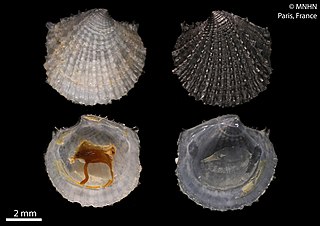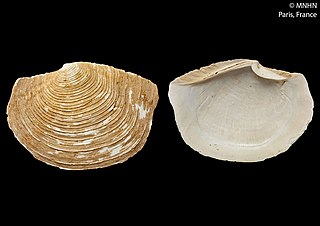
Crassispira is a genus of small predatory sea snails with narrow, high-spired shells, marine gastropod mollusks in the family Pseudomelatomidae. They first appeared in the fossil record approximately 48.6 million years ago during the Eocene epoch, and still exist in the present day.

Vesicomyidae is a family of saltwater clams, marine bivalve molluscs in the superfamily Glossoidea.

Lucinidae, common name hatchet shells, is a family of saltwater clams, marine bivalve molluscs.

Spisula is a genus of medium-sized to large marine bivalve mollusks or clams in the subfamily Mactrinae of the family Mactridae, commonly known as surf clams or trough shells.

Lucina amiantus, or the decorated lucine, is a species of bivalve mollusc in the family Lucinidae.
Pleurolucina leucocyma, or the saw-toothed pen shell, is a species of bivalve mollusc in the subfamily Lucininae of the family Lucinidae.

Codakia is a genus of saltwater clams, marine bivalve molluscs in the family Lucinidae.
Stewartia floridana is a bivalve of the family Lucinidae that is chemosymbiotic with sulfur-oxidizing bacteria.

Lucina is a genus of saltwater clams, marine bivalve molluscs.

Radiolucina is a genus of bivalves belonging to the family Lucinidae.

Lucinisca is a genus of saltwater clams, marine bivalve molluscs in the subfamily Lucininae of the family Lucinidae.

Pleurolucina is a genus of saltwater clams, marine bivalve molluscs in the subfamily Lucininae of the family Lucinidae.

Lucinoma is a genus of saltwater clams, marine bivalve molluscs in the subfamily Codakiinae of the family Lucinidae.

Pandora is a genus of small saltwater clams, marine bivalves in the family Pandoridae.

Pillucina is a genus of saltwater clams, marine bivalve molluscs in the subfamily Lucininae of the family Lucinidae.

Pseudolucinisca is a genus of bivalves in the subfamily Leucosphaerinae belonging to the family Lucinidae.

Rostrilucina is a genus of bivalves on the subfamily Myrteinae, belonging to the family Lucinidae.

Taylorina is a genus of bivalves on the subfamily Myrteinae, belonging to the family Lucinidae.

Troendleina is a chemosymbiotic bivalve genus in the subfamily Lucininae of the family Lucinidae.

Wallucina is a chemosymbiotic bivalve genus in the subfamily Lucininae of the family Lucinidae.

















